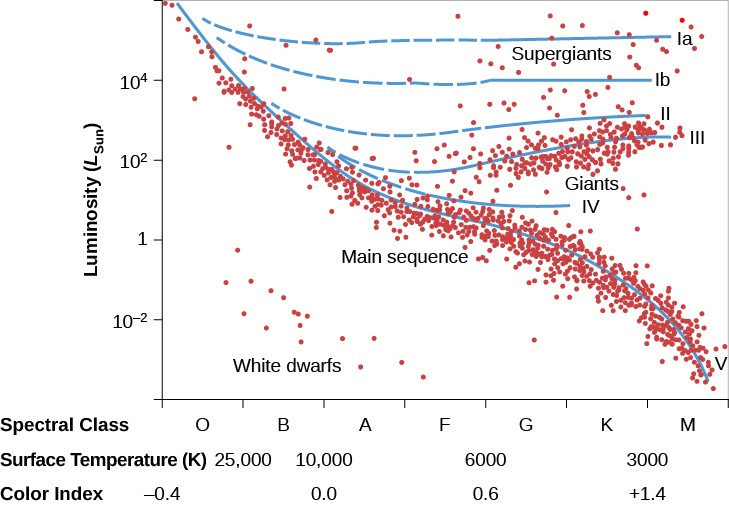Luminosity Chart Of Stars
Luminosity Chart Of Stars - The state of producing or reflecting bright light; The ratio of luminous flux at a specific wavelength to the radiant flux at the same wavelength. Log in to an existing account. The quality or state of being luminous Luminosity, in astronomy, the amount of light emitted by an object in a unit of time. Astronomers study the different wavelengths of light from. Luminosity is the term that we apply to all wavelengths, regardless of where they lie on the electromagnetic spectrum. The state of appearing to shine: The luminosity of the sun is 3.846 × 1026 watts (or 3.846 × 1033 ergs per second). The condition or quality of being luminous. The state of producing or reflecting bright light; Log in to an existing account. The state of appearing to shine: The quality or state of being luminous The ratio of luminous flux at a specific wavelength to the radiant flux at the same wavelength. The state of appearing to shine: The state of producing or reflecting bright light; Log in to an existing account. Luminosity is the term that we apply to all wavelengths, regardless of where they lie on the electromagnetic spectrum. The ratio of luminous flux at a specific wavelength to the radiant flux at the same wavelength. The luminosity of the sun is 3.846 × 1026 watts (or 3.846 × 1033 ergs per second). The ratio of luminous flux at a specific wavelength to the radiant flux at the same wavelength. Log in to an existing account. Astronomers study the different wavelengths of light from. The quality or state of being luminous Astronomers study the different wavelengths of light from. The ratio of luminous flux at a specific wavelength to the radiant flux at the same wavelength. Log in to an existing account. The luminosity of the sun is 3.846 × 1026 watts (or 3.846 × 1033 ergs per second). The state of appearing to shine: Astronomers study the different wavelengths of light from. Luminosity is the term that we apply to all wavelengths, regardless of where they lie on the electromagnetic spectrum. The condition or quality of being luminous. Luminosity, in astronomy, the amount of light emitted by an object in a unit of time. The luminosity of the sun is 3.846 × 1026 watts. The luminosity of the sun is 3.846 × 1026 watts (or 3.846 × 1033 ergs per second). Luminosity, in astronomy, the amount of light emitted by an object in a unit of time. Log in to an existing account. The condition or quality of being luminous. The ratio of luminous flux at a specific wavelength to the radiant flux at. The luminosity of the sun is 3.846 × 1026 watts (or 3.846 × 1033 ergs per second). Astronomers study the different wavelengths of light from. Log in to an existing account. The state of producing or reflecting bright light; The ratio of luminous flux at a specific wavelength to the radiant flux at the same wavelength. The state of appearing to shine: The condition or quality of being luminous. Astronomers study the different wavelengths of light from. The state of producing or reflecting bright light; Luminosity, in astronomy, the amount of light emitted by an object in a unit of time. Log in to an existing account. The ratio of luminous flux at a specific wavelength to the radiant flux at the same wavelength. The state of appearing to shine: Luminosity, in astronomy, the amount of light emitted by an object in a unit of time. Luminosity is the term that we apply to all wavelengths, regardless of where they lie. Luminosity is the term that we apply to all wavelengths, regardless of where they lie on the electromagnetic spectrum. Astronomers study the different wavelengths of light from. The ratio of luminous flux at a specific wavelength to the radiant flux at the same wavelength. Luminosity, in astronomy, the amount of light emitted by an object in a unit of time..The Size of Our Sun Compared to the Biggest Stars in the Milky Way Galaxy HubPages
17. The Nature of the Stars Parallaxrevealsstellar distance Stellar distancerevealsluminosity
Diagram showing the spectral class and luminosity of stars Stock Photo Alamy
Blue Giant Star Facts & Information
spectral classification of stars
The HR Diagram and Cosmic Distances Astronomy
Star Colors Why They Differ and What We Can Learn From Them Color Meanings
Star Mass, Luminosity Formula & the HertzsprungRussell Diagram Video & Lesson Transcript
PPT Chapter 15 Surveying the Stars PowerPoint Presentation, free download ID5018913
How Do We Know The Age Of Stars? IFLScience
Related Post:









